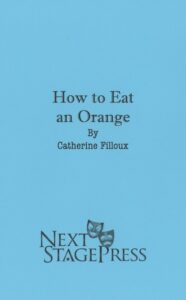HOW TO EAT AN ORANGE
by Catherine Filloux

A one-woman play about the visual artist and activist Claudia Bernardi, her childhood in Argentina under the military junta, and her subsequent work digging up the past. Histories are woven together in a kaleidoscopic play that depicts how both families and justice may be reconfigured.
- Cast Size: 1W
- Running Time: 90+ minutes
- Royalty Rate: $75 per performance
Order Digital Download (Will NOT download to phones, cannot be printed)
About the Artists

CATHERINE FILLOUX is an award-winning French Algerian American playwright and librettist, who has been writing about human rights for decades. Her plays and operas have been produced nationally and internationally. In New York City, Filloux’s new musical “Welcome to the Big Dipper” (composer Jimmy Roberts) premiered Off-Broadway at the York Theatre, and her play “How to Eat an Orange” premiered at La MaMa Downstairs Theatre. Catherine’s new play “White Savior” was nominated for The Venturous Play List. Filloux’s other recent plays include: “turning your body into a compass” her livestream web drama at CultureHub, NYC; “whatdoesfreemean?” at Nora’s Playhouse, NYC; “Kidnap Road”, La MaMa, NYC; “Selma ‘65”, NYC and U.S. tour; “Luz”, La MaMa and Looking for Lilith in Louisville, KY. Catherine is the librettist for four produced operas: “Orlando” (composer Olga Neuwirth) is the first opera at the Vienna State Opera by a woman composer-librettist team (2022 Grawemeyer Award); “Where Elephants Weep” (Chenla Theatre, Cambodia, composer Him Sophy) broadcast on Cambodian national TV and Broadway on Demand. Filloux has traveled for her plays to conflict areas including Bosnia, Cambodia, Guatemala, Haiti, Iraq, Morocco; and to Sudan and South Sudan on an overseas reading tour with the University of Iowa’s International Writing Program. Catherine received her French Baccalaureate in Philosophy with Honors in Toulon, France. She has spoken for media and organizations around the world. www.catherinefilloux.com
Claudia Bernardi is an Argentine artist who works in the fields of visual art, human rights and social justice, combining installation, sculpture, painting and printmaking. She has worked with communities that have suffered state terror, violence, forced exiles and who are victims of human rights violations.
When I read the description of “How to Eat an Orange” and saw that the play would be spoken through one woman only, tunnelling into the past and invoking the voices of the past and family, I had a notion that it would feel claustrophobic, and I was correct. Though I did not find this to be a negative thing, as the imposing, claustrophobic feeling I had when reading this piece made for a tight encapsulation of my emotions. Everything felt heightened and I could not be any more connected than I was to Claudia Bernardi, whose incredible life this play delves into. Catherine Filloux’s unipersonal retelling of the devastating history of the Argentinian Military Junta and Bernardi’s experience growing up in the middle of it spans decades, countries, and is a representation of justice and Latin American strength.
“There is a birthmark born today. A tattoo on my soul. … The recognition that I have profoundly changed. There is no fear.” (19) Is what Claudia reflects on the day she was released from her arrest in Buenos Aires: a testimony of strength. Through Filloux’s writing the audience sees a woman who grieved, a woman who fought and won. The combination of the isolation of this one person only present during the audience’s time with this play, the videos showcasing the real life Claudia, the chaos, and resilience of the people encases the audience in this space of unavoidable grief: it feels heavy and unrelenting. For the Latin American audience, this play presents history in a way that sticks like a “tattoo on the soul” of the ones who lived it or know of it; it provides a space to remember the turmoil, the injustice, deaths, the cruelty, to grieve the ones dead at the hands of the violent and the ones left to live with it. Claudia’s mother asks her daughter to not forget her—this play will remember.

Review How to Eat an Orange.